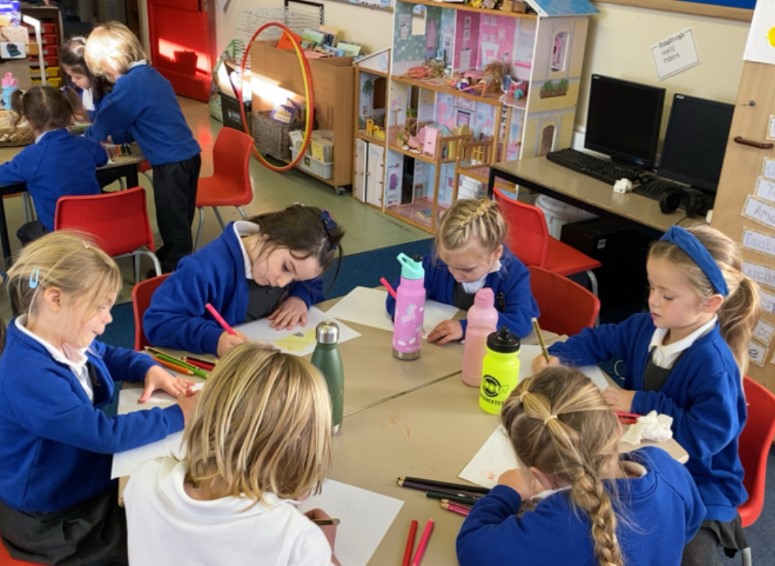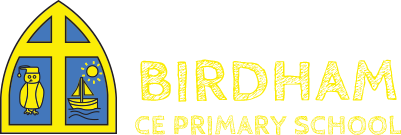New Parents
We aim to make starting school a very positive experience for your child. In the current climate, we are unable to say for certain the format that the school day may take in the first few weeks of September, but please be assured that we will do our very best to make the transition as smooth and enjoyable as we can for your child.
So what does the 'Early Years Foundation Stage' look like at Birdham?
What happens on the first morning of school?
Starting school is exciting, but it can be a worrying time. You can help your child to settle in by talking about what they can expect. Why not sit together and watch the following welcome videos.
Children like what is familiar. The idea of school may seem a little daunting, but many of the activities are ones your child already loves doing at nursery or playgroup and they will feel quite comfortable with them.
What happens if my child cries?
Quite naturally, this is an anxious time, especially if it is your first child starting school. However, a swift ‘hand-over’ to the teacher or teaching assistant is the best and most effective remedy. Most children stop crying as soon as Mum or Dad has gone! If there is a continuing problem the school will contact you. No news is good news.
What should my child wear/ bring to school?
Special clothes for school can feel strange. Let your child wear them before the first day to get used to them. Make dressing and undressing easy (important for P.E. and the toilet!) Not too many buttons, lots of velcro fastenings and elasticated waists. Tying laces is very tricky - we always suggest you choose shoes with Velcro fastenings so your child can feel independent.

School uniform is as stated in the school prospectus, including a P.E. bag containing a school T-shirt, navy or black shorts and plimsolls and can be obtained from the school office. Children are not allowed to wear boots in school and socks must be worn with sandals. P.E. bags are brought in on a Monday and can be taken home on a Friday to wash over the weekend.
If your child is not having a school lunch, they will also need a lunch-box and a drinks container. If they are having a school hot lunch, they will just need to bring in a drink. As part of our Healthy Schools Initiative, children are provided with a free a mid-morning snack of fruit or vegetables. We also try to encourage parents to send healthy lunches for the children- avoiding sweets etc.
Please note that Birdham School is a nut- free environment, owing to the fact that we sometimes have a few children in school with severe nut allergies. If an item containing nuts is inadvertently sent in it will be returned to you.
Label everything please and show your child where the label is. If he/she finds it hard to read his/her name, draw a face or a shape on the label as an extra guide.
What should my child not bring to school?
Generally we ask children not to bring in toys or anything precious that is likely to cause distress if broken or lost. However, they might feel that they would like to bring in a favourite soft toy for comfort on their first few days and of course this is ok.
We sometimes have a ‘show and tell’ session when the children are allowed to bring in an item which they would like to talk about- this is to encourage the children to share things about themselves with the rest of the class. You will receive a letter informing you as to when these will happen. Jewellery is not allowed and any form of earring must be removed so your child can take part in P.E. lessons. If it is not possible to remove them, we will put special surgical tape over them to protect your child’s ears.
Medicines cannot be administered by anyone in school. Inhalers are kept safe in the office and an adult will accompany your child if he/she needs to use an inhaler.
What happens if your child is unwell at school?
If your child is feeling unwell, the school will contact you and ask you to arrange for someone to take your child home. If your child is unwell and unable to attend school we do need to be informed, otherwise we have to ring to check with you as to why your child isn’t in school. It is important that the school has an up to date contact or emergency phone number at all times.
What happens in collective worship / Assemblies?
On Mondays Collective Worship is lead by the Headteacher. On Tuesdays, the Headteacher or a class teacher leads the Collective Worship. On Wednesdays, the children have a singing assembly. On Thursdays, Collective Worship is led by either Father Jonathan Swindells from the Church, or Frank (a friend of the school) - they come in on alternate weeks.
On Friday mornings at 9:05 we have our Sharing Assembly. Parents are invited into these Assemblies, and we have opportunities to share children’s work and reward children for individual achievements by giving them ‘star awards’. Team points are also totalled up from each class and the winning team is announced each week. These assemblies occur almost every Friday (excluding the very first and last Friday of each term). They can also be found on the calendar on this website.
What happens at lunchtime?
Afternoon school starts at 1:00. The KS1 children eat their lunch in the first sitting - 12:00-12:30. They then go out to play. They all eat at tables in the hall and are supervised by dining room assistants. They can sometimes find the busy hall a little overwhelming at first, so Mr Byrne or Mrs Jeffers has lunch with them if they need additional support.
What happens at the end of the day?
To make sure your child is safe, parents/carers collect their children from 3:10. An adult will hand them over to you from the back door of the Reception Classroom, which opens onto the KS1 Play area. Please make sure you tell us if there is a change in the arrangements for their collection, so we always know who your child is going home with.
What happens if I have a concern?
We are always happy to discuss any worries or problems you might have. If, however, it requires a lengthy discussion, first thing in the morning is not a good time as teachers are busy setting up the classroom for the day. After school is usually a good time and teachers will be happy to arrange an appointment to see you. Share your problems quickly, however small, and don’t dwell on them - a problem shared is a problem solved.
How can I help my child at home?
Children are often too tired at the end of the day to talk about school in any detail. Let them unwind and play. There is plenty of time to talk if he/she should wish to do so. If they do wish to share some of the things that have happened, it is important that you are always positive about school. Never appear anxious to your child as this can easily be passed on to them. Always praise their achievements and make them feel positive about their learning.
Encourage your child to be as independent as possible. Help him/her to learn to be able to dress/undress, and to be able to go to the toilet and clean him/herself independently before starting school. Little things like Velcro fastenings on shoes and plimsolls can help towards this independence.
Helping with reading at home
Your child will need a school reading bag. The first one is complimentary as a welcome gesture from the FPTA. This helps to keep reading books, reading record books etc. all together. Your child should bring their reading bag every day. At the moment, because of the current situation with Covid-19, we are unable to allow children to share books. However, usually your child will share a simple book with an adult at school and bring it home to share with you. Hopefully we will be able to return to this soon. We will have other suggestions if this is not the case by September.
The main approach to starting to read will be through phonics. This is where the children learn the sounds that each letter (or group of letters) makes. They then begin to blend the sounds together to hear the words. Your child will have letter sounds and games to help them learn these sounds as quickly as possible during the first term, as this makes a huge contribution to their ability to read words independently by sounding them out.
We also have an excellent school library, and each child has a laminated library card with a bar code for identification, enabling them to have access to a rich variety of real books. This card stays attached to their reading bag. The children would usually change their library book every Friday, and bring it home for you to read to them. Should this be the case, please make sure that it is returned to school the following week.
At home, your child needs to spend about 10/15 minutes every day on reading or phonics activities. This could involve talking about a story and illustrations, or playing some phonics games. They may also have some ‘tricky words’ to practise. These are key words which cannot be sounded out phonetically, so learning them by sight will help them as their reading skills develop. Your child will initially read from memory and will use the pictures to assist them. They will gradually begin to notice familiar words, and to sound out words using letter sounds.
Please sign the reading record book each time you read with your child. This is very important as it lets us know in school that the books have been read and may be ready to be changed.
Please note- the books will not be changed daily. If they have read it once, read it again to encourage them to build some fluency. If they need additional reading material then sharing books from home and looking for familiar letters or words on the page, or talking about what is happening in the story or the pictures and what might happen next, are valuable things you can also do.
A little and often is the best approach. If your child is very tired, just read a bedtime story. Listening to stories is also a very valuable part of their reading development.
Visits to the local library also help your child to enjoy different books, and have a range of stories read to them. Re-reading of favourite stories is to be encouraged as this can help your child connect the spoken word to the print on the page.
Read lots of stories together. Encourage your child to hold the books, turn the pages and join in with you. Make reading fun, always praise and encourage your child when he/she is pretending to read stories, as this is an important stage in becoming a reader. When he/she begins to recognise words, encourage him/her to point a finger under them as they are read.
Understanding the story also enables the child to make sense of what is happening and to predict what will come next, so be sure to ask them questions about what they are reading.
Please remember- it is not a race! The focus should be on enjoyment of books and wanting to share them, rather than worrying about what other children are reading.
Communication
There are many ways in which we communicate with you about your child. Make sure you sign up to ClassDoJo and that we have your contact details, including mobile numbers and an email address.
The school website contains a wealth of information, including the school diary, and a link to our twitter feed. Please check these things regularly so you don’t miss anything!
An electronic school newsletter is issued every month to keep you abreast of any exciting developments.
class dojo
 This is a FREE online resource (app) that we use for communication with you. It sends you key learning stories, and alerts you to 'dojos' we have issued to reward your child about something they have done at school. It is also a useful way for the teacher to send you quick messages, so please sign up ASAP. Please note, this is our teachers’ primary means of communication with parents during school.
This is a FREE online resource (app) that we use for communication with you. It sends you key learning stories, and alerts you to 'dojos' we have issued to reward your child about something they have done at school. It is also a useful way for the teacher to send you quick messages, so please sign up ASAP. Please note, this is our teachers’ primary means of communication with parents during school.
Meet the Teacher
There is normally a ‘meet the teacher’ session at the beginning of the school year to introduce you to the class, and tell you a little about the things your child will be doing in class. We also conduct home visits to meet you and your child in the summer term. You will receive a phone call to organise an individual appointment for this.
Parent help in school
We are always very keen to have volunteers in school to help with reading, school trips and other activities. Please let us know if you can help, but be aware that you may not always be hearing readers in your child’s class.
Do you know of any other adults - grandparents or aunties/uncles - who might be able to offer their services? All help is welcomed- just let us know. It is also a good way to get to know other parents and their children. Everyone has some way of contributing so don’t be shy, please help in any way that you can.
Please Note:
All adult helpers are subject to an enhanced DBS check, so please be prepared to bring in some documentation so we can get this completed if you think you wish to become a school volunteer. For safeguarding reasons, you would not be allowed to help in school until this process has been approved.
I hope this page will answer some of your queries and make the start of our partnership a very happy one. However, if you have any questions at all, please do not hesitate to contact the school office.


